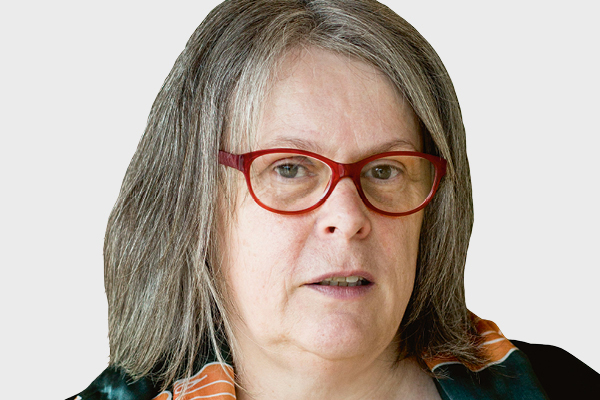You are viewing 1 of your 1 free articles
Inside the only refuge specifically for women with learning disabilities
Few resources exist for disabled women escaping abuse, despite this group being at greater risk. Kate Youde reports on the only refuge focused on women with learning disabilities and autism. Illustration by Getty
Disabled people are more likely to be victims of domestic abuse – but almost no refuges and resources are set up to be accessible for them. Only one in five refuges in England offers support for women with learning disabilities, according to Women’s Aid.
It is a horrifying catch-22 situation. Inside Housing has come to an undisclosed location in London to visit one project that aims to close part of that gap: Beverley Lewis House.
This refuge is for women with learning disabilities or autism who are fleeing, or at risk of, abuse or violence. Opened in 1995 by East Thames Housing and now run by the care and support subsidiary of 95,000-home L&Q, it is the only service of its kind in the country.
A 2015 Public Health England report found disabled people experience “disproportionately higher rates of domestic abuse” and that the abuse is more lengthy, severe and frequent compared with non-disabled people. Based on incidents reported to the police in 2014, it found 15.7% of disabled women in England and Wales had experienced domestic abuse in the previous year, compared with 7.1% of non-disabled women.
A quick overview of some of the women who have made use of Beverley Lewis House tells the story of why the service is needed better than any statistics. There is Diana*, who has severe learning disabilities and was financially and emotionally abused by her mother; Aisha*, who fled a violent forced marriage; and Chloe*, 22, who is autistic and has dissociative identity disorder due to the trauma of sexual, physical and emotional abuse she experienced at home.
Lisa Scivetti, who has managed the refuge since March, says the perpetrators are often carers. “This is the person you depend on the most and this is the person who is destroying your life,” she says.
Inside Housing speaks to Vicky*, 32, who has lived in Beverley Lewis House for a year – which she calls her “new beginning”. Vicky has mild-to-moderate learning disabilities and schizophrenia, and struggles with impulse control. Sitting on a black sofa in a communal lounge, a big bottle of Pepsi tucked under her arm, she explains that before she came here life was spiralling out of control. Residing in non-specialist supported accommodation, she felt “really out of it” and self-harmed by banging her head against the wall. She gambled on slot machines and begged for cash to fund her habit. “I used to sleep with men for money,” she says. “I have stopped that now.”
Since moving here, she tells Inside Housing, she has developed a “positive behaviour support plan” with staff. Vicky is spacing out her cigarette breaks and changing her diet by limiting herself to one ice cream, one packet of crisps and one chocolate bar a day, kept by staff in the office. She has stopped gambling and enjoys trips to the cinema, shops and pub, and singing karaoke. She takes part in drama and art therapy, while other sessions tackle healthy relationships and building self-esteem.
Being at Beverley Lewis House has made “a lot of difference”, Vicky says. She is looking forward to an interview for a voluntary job working with older people, helping with washing up, cooking and cleaning, and hopes to eventually get paid work. “I don’t hurt myself any more,” she adds.
The refuge has six flats, each with a kitchen, two bedrooms, living space and a bathroom, plus a communal kitchen and lounges, and a paved garden with two pet rabbits and vegetable plots. Staffed 24/7, the purpose-built unit could accommodate up to 12 women, depending on whether their complex needs would enable them to share a flat.
When Inside Housing visits there are four residents and two void flats, although these are filled not long after. Women typically stay a minimum of two years.
“Over the past couple of years there hasn’t been the right kind of promotion and marketing of the service,” says Ms Scivetti. “A lot of social care teams don’t know we exist so don’t know to refer to us rather than to other options that might be inappropriate like psychiatric units.”
Most referrals come from local authority adult social care learning disability teams across the country; sometimes there are calls from refuges unable to meet a woman’s needs (see box).
In numbers
1.4 million
People in the UK who have a learning disability
2.5%
Survivors accessing refuges on one day in July 2017 who had a learning disability
3.3 years
Average length of abuse before a disabled victim accesses support (2.3 years on average for non-disabled victims)
21.4%
Refuge services in England which offer support for women with learning disabilities
19%
Disabled victims who report abuse from multiple perpetrators (6% for non-disabled victims)
31%
Disabled victims who live with the perpetrator of abuse (18% for non-disabled victims)
Sources: Mencap, Women’s Aid, SafeLives
Dr Noelle Blackman, chief executive of Respond, a charity aimed at lessening the effect of trauma and abuse on people with learning disabilities, says women with learning disabilities are seen as an easy target by coercive and controlling men.
They are typically more limited socially, she says, so less likely to have a friend to tell about the abuse. “They might not have the language or capacity to conceptualise that what is going on is not normal in a relationship,” says Dr Blackman. It is more difficult for people to “notice bruises or a black eye, or [that] they are not attending the place they used to, because they are pretty hidden away anyway”, she adds. Dr Blackman says schools, particularly special schools, are not good at teaching young people about safe relationships.
Respond has delivered therapy for women at Beverley Lewis House. “The starting point for a woman with learning disabilities is often really low self-esteem, a lack of feeling they have agency over their own life, a lack of confidence that they will ever be able to have a loving relationship,” says Dr Blackman, “then that’s confirmed by being in an abusive relationship or being raped. The work is often less about the more recent situation, which is awful in its own right, and more about living a life with a learning disability.” A setting such as Beverley Lewis House provides a “safe oasis” in which women can access therapy, start to recover and experience positive relationships.
Respond provides training for the staff and offers a “reflective space” to support them. “Women who have experienced such challenges are often quite challenging themselves,” says Dr Blackman.
L&Q would not give the overall running costs for Beverley Lewis House, but a local authority funds the 24-hour specialist support for a resident’s placement from its adult social care budget, while housing benefit covers the rent. The Three Guineas Fund provided £200,000 over 2016/17 and 2017/18 to cover a positive behaviour support specialist, external clinical supervision for support staff and interventions including art and music therapy. The housing association is waiting to hear whether its funding application for the next three years has been successful.
This service hasn’t suffered from council funding cuts, but the national picture for refuges is bleak. Sian Hawkins, head of campaigns and public affairs at Women’s Aid, says demand for women’s domestic abuse services outstrips supply and that, while welcomed, the forthcoming Domestic Abuse Bill is likely to “drive up demand” further.
“A lot of social care teams don’t know we exist so don’t know to refer to us.” - Lisa Scivetti, manager, Beverley Lewis House
“We have seen the dismantling of the national network of our services over the past couple of years because of funding cuts from local authorities,” states Ms Hawkins. “But also due to the fundamental change in the way services are being commissioned and the process of competitive tendering, which favours larger generic providers.” Women’s Aid found 17% of specialist services – independent services led by and for women with a background in working in issues of violence against women and girls – were lost between 2010 and 2014.
Then there is a further “gap”, Ms Hawkins points out, in the support available for women with any kind of additional need.
Gudrun Burnet, senior business partner (domestic abuse) at Peabody and co-founder of the Domestic Abuse Housing Alliance, says it is important for associations to protect local specialist services. “If we as a housing sector aren’t making it a priority we are not doing what we can to reduce that figure of two women a week being murdered,” she says.
Ms Scivetti is planning a conference to address the lack of awareness. She says social workers sometimes show a “lack of understanding” of the complex needs of women with learning disabilities: in one case, a woman was placed in a hotel while funding for her placement was arranged; unable to cope, she went back to her abusive husband, who was also her carer.
Aimed at commissioners of adult social care, police and crime commissioners and first responders, the conference would cover how to communicate with people with mental health issues or learning disabilities so as to better recognise abusive situations. “If there were more schemes like [ours] and more people knew the work that could be done, there would definitely be the demand out there,” says Ms Scivetti.
*Names have been changed











